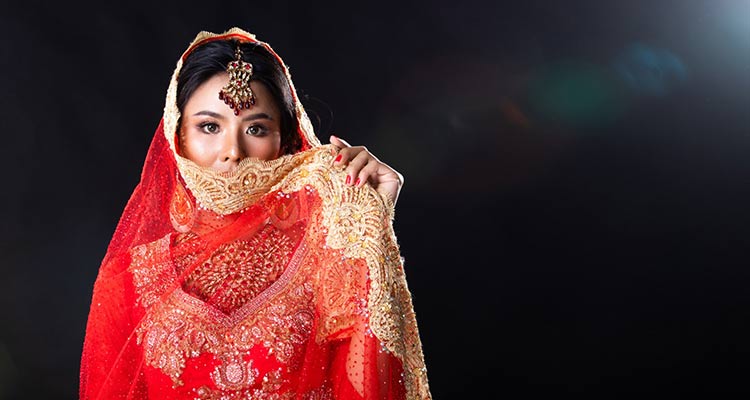There are many new revelations which even after travelling around the sun for more than 20 years the brides are unaware of. The marriage introduces them to those secret sides of their personality and hidden wishes. Related reading: Why newly wed couples in Bengal cannot spend the first night together
Rules on what to wear and how to wear it
After my marriage, I came to know that the tummy revealing sari is more decent than full body covering salwar-kurta. It was perfectly fine with me. I loved wearing saris and I still do, but not when I am forced to wear it by the rules laid by someone else just to show their authority. Right after the wedding it was more exciting to wear those new saris especially bought for me with matching fitted blouses. Those were my saris and not the ones lifted from my sister’s wardrobe. But then the bomb was dropped for which I was unprepared. “You have to take the ghunghat and cannot come in front of all the elder male members of the family.” “Why?” “It’s a way to show respect to your elders. Hasn’t your mother taught you anything about it? This is not your maika where you can roam around. This is your sasural where you have to follow etiquette and manners and will have to behave well.”
Never question the rules
Fine…got it. So the son’s wife has to wear a sari and have to maintain the parda as a mark of respect to the sasurali elders, especially the males. Why are the daughters allowed to move around freely without dupatta or with the falling pallu exposing one breast in front of male members of the family? After all, they too should respect the elders, shouldn’t they? Why is the daughter’s husband allowed to move around freely with head held high and treated like an esteemed guest? Why can’t the rules be the same for both? After all, both are the spouses of the sons or daughters of the family. Ask these questions and be prepared to be questioned about your upbringing. “What have the parents taught her?” No questions asked, I stayed behind the veil. Related reading: 10 thoughts that come to your mind when your mother-in-law announces her visit next month
Bitter lessons to learn
It was only after my marriage that I came to know that it was my ‘childhood dream’ to be a meek, shy, coy sari clad bahu hiding her face behind the parda which I loathed until I got married. I felt the pain of untouchables when I couldn’t sit on the same mattress with the family. I learned to hold the urge to relieve until there was no ‘elder male member’ outside before leaving the room with no attached toilet. Slowly but surely, I learnt to eat alone in the company of my tears in my room while the rest of the family enjoyed their meal together amidst chatter and laughter. My deep cherished desire to become a traditional Indian bahu, hidden somewhere in my soul of which even my birth mother was unaware of, was discovered and fulfilled by my lawful mother and sisters. And I came to know that it is by your attire and not your attitude that you give respect. Really my parents never taught me that. They were so naïve to teach me to respect elders by my attitude and behaviour. The journey from shorts and skirts to sari was really quick. I came to know that you can give respect to elders only by the clothes you choose to wear. I came to know that all elder males of the family are the most dreaded creatures of the home and in order to keep myself safe from their prying eyes I have to hide behind closed doors. The girl who had never seen her mother behind the veil was now forced to maintain one in the name of culture.
A system that has become warped and unfair
Those who have not lived behind the parda will not understand the cruelty behind it. The system which might have started to protect the child bride and child widow from being sexually harassed by the male members of the family was still followed and that too with pride. The only difference is that now it is practised to show the authority and enslave the bride. The men of the house are not taught to respect and treat the ladies of the house equally. Instead, the bahus are forced to hide behind the veil in the name of culture and tradition. I came from a family where there was no gender discrimination; neither the bahus were treated differently from the daughters of the family. I opposed the system. “Why do only bahus have to follow this parda system? Even daughters should also be made to do so.” The response was: “Why will they? They have played naked in this house and in their father’s lap. You haven’t.” What rubbish. I felt like saying that surely they can’t play naked at this age and must have stopped that way back. But then I remembered my mom’s teaching: “Every mistake you will do will be our failure and our parenting will be questioned. So keep your tongue behind your teeth. You won’t have to live with your in-laws. It will just be a matter of a few days. Just keep quiet. ”
Then we made our own home
Soon I flew with my husband to make his bachelor’s pad our home. Within a month my mother-in-law visited us. A month’s time is enough for a new bride to make the house a home and create a small world of theirs away from the family. Even we had created a world where only the two of us lived. It became a ritual to sit in the evening and chat about our day. It was obvious to have the dinner together sitting at the same table. Even that day when my husband returned from office I opened the door, smiled and gave him a quick hug, not realising that we were being watched. He went to sit with his mother in the balcony. I brought tea and pulled a chair to sit there. My mother-in-law in a stern authoritative voice said, “Take your tea and go inside.” “Why?” I was clueless why she was asking me to go and have tea alone. There were just the three of us. The only male there happened to be my husband. With whom shall I keep parda here? Frustrated, I almost shouted, “Do I have to keep parda with him too? But he has seen me naked and will see in the future too.” The shock all over her face and my husband’s mischievous smile is still fresh in my mind. As far as the parda system is concerned, I still I have to go through the torture when I visit my sasural.



